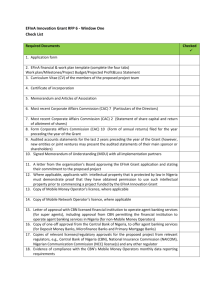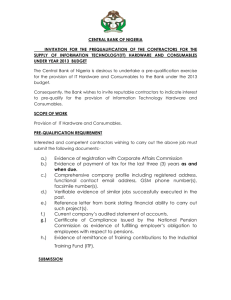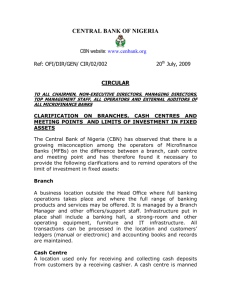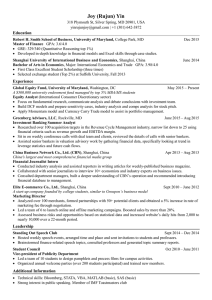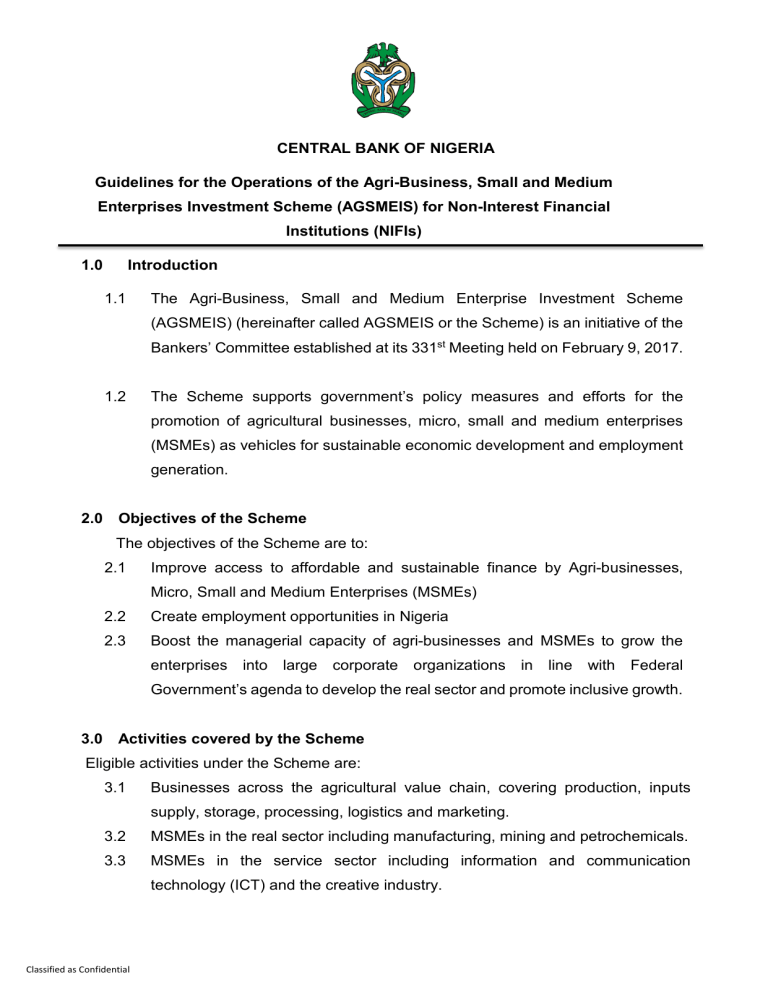
CENTRAL BANK OF NIGERIA Guidelines for the Operations of the Agri-Business, Small and Medium Enterprises Investment Scheme (AGSMEIS) for Non-Interest Financial Institutions (NIFIs) 1.0 Introduction 1.1 The Agri-Business, Small and Medium Enterprise Investment Scheme (AGSMEIS) (hereinafter called AGSMEIS or the Scheme) is an initiative of the Bankers’ Committee established at its 331st Meeting held on February 9, 2017. 1.2 The Scheme supports government’s policy measures and efforts for the promotion of agricultural businesses, micro, small and medium enterprises (MSMEs) as vehicles for sustainable economic development and employment generation. 2.0 Objectives of the Scheme The objectives of the Scheme are to: 2.1 Improve access to affordable and sustainable finance by Agri-businesses, Micro, Small and Medium Enterprises (MSMEs) 2.2 Create employment opportunities in Nigeria 2.3 Boost the managerial capacity of agri-businesses and MSMEs to grow the enterprises into large corporate organizations in line with Federal Government’s agenda to develop the real sector and promote inclusive growth. 3.0 Activities covered by the Scheme Eligible activities under the Scheme are: 3.1 Businesses across the agricultural value chain, covering production, inputs supply, storage, processing, logistics and marketing. 3.2 MSMEs in the real sector including manufacturing, mining and petrochemicals. 3.3 MSMEs in the service sector including information and communication technology (ICT) and the creative industry. Classified as Confidential 3.4 Other activities as the Central Bank of Nigeria (CBN) may determine from time to time. 3.5 Financing under the Scheme shall be for start-ups, business expansion or revival of ailing companies and shall be in compliance with provisions of BOFIA (1991) as amended and the principles underpinning operations of NIFIs. 4.0 Funding 4.1 A Fund to be known as ‘AGSMEIS Non-Interest Fund’ to be domiciled in a dedicated account with the CBN is to be created. 4.2 Each Non-Interest Deposit Bank, full-fledged or window, shall set aside 5% of its profit after tax (PAT) annually as contribution to the Fund. 4.3 Each Non-Interest Deposit Bank shall transfer its contribution to the CBN not later than 10 working days after the Annual General Meeting (AGM) of the participating bank. 5.0 Governance of the Scheme 5.1 Board of Directors (BOD) The Scheme shall have a Board of Directors (BOD) which shall be constituted by the Bankers’ Committee. The Board shall comprise of eight members: i. Five from the Bankers’ Committee (Top contributing banks to the Scheme) ii. Two representatives of the CBN (DDFD and DBSD) iii. The BOD shall select a Chairman for the Board iv. The Managing Director/CEO of the SPV shall be appointed by the BOD. 5.2 Investment Vehicle A Special Purpose Vehicle (SPV) shall be established to manage and monitor investments/projects under the Scheme. 5.3 Secretariat The Development Finance Department of the Central Bank of Nigeria shall serve as the Secretariat for the Scheme. 1 Classified as Confidential 6.0 Application of the Fund The application of the Fund shall be categorised into three broad components: debt, equity and developmental components. • Debt – 50% • Equity – 45% • Developmental – 5%. 7.0 Debt Component The debt component shall constitute 50% of the fund which shall be disbursed as financings to eligible businesses through Non-Interest Deposit Money Banks. The debt component shall comprise term financing (including equipment finance*) and/or working capital where applicable. *Asset purchased shall be registered with the National Collateral Registry (NCR). The terms of the financings shall be as follows: i. Financing limit: N10,000,000 ii. Mark-up: iii. Tenor: 5% per annum Up to 7 years (depending on the nature/gestation period of the project) iv. Moratorium: Maximum of 18 months for principal and 6 months on mark-up. 7.1. Documentation Requirements 7.1.1 Micro, Small and Medium Enterprises: i. Duly completed application form. ii. Bank Verification Number (BVN). iii. Certificate of Training from recognised Entrepreneurship Development Institution (EDI) or evidence of membership of organised private sector association. iv. Letter of Introduction from any of the following: Clergy, Village Head, District Head, Traditional Ruler, senior civil servant etc (for individuals/microenterprises only). v. Evidence of registration of business name or certificate of incorporation and filing of annual returns (where applicable) in compliance with the provisions of the Companies and Allied Matters Act (1990). 2 Classified as Confidential vi. Tax Identification Number (TIN) and current Tax Clearance Certificate (TCC) where applicable. 7.2 Modalities: 7.2.1 Micro, Small and Medium Enterprises: i. Eligible applicants shall submit completed application form to the EDIs, Apex Trade Associations (ATAs) or Non-Interest Deposit Money Banks where applicable. ii. The EDIs, ATAs and Non-Interest Deposit Money Banks shall collate, appraise and submit applications to CBN. iii. An eligible applicant shall submit an application to any of the PFIs. iv. The PFI shall appraise and forward successful applications to the SPV. v. The SPV shall review the applications for completeness, approve and forward to the CBN vi. The CBN shall release funds to the PFIs as agents of the SPV for asset purchase. vii. The PFI shall purchase the asset on behalf of the SPV for on-selling to the applicant using exchange-based contracts of Murabaha, Salam or Istisna’a at a mark-up of 5% which is due in whole to the SPV. viii. The PFI shall transfer the financed asset through any of the approved exchangebased contracts to beneficiaries within 10 working days from its acquiring the asset on behalf of the SPV. ix. The beneficiaries shall start making payments after a moratorium of 18 months for principal and 6 months for mark-up. 8.0 Equity/Corporate Debt Financing Component The indirect component shall constitute 45% of the Fund which shall be channelled through SEC-licensed Islamic Fund Managers or Windows, for equity, quasi-equity and non-equity financing in agri-businesses and SMEs. 8.1 Equity investment The terms of the equity investment shall be as follows: i. Limit: 40% of investee company’s equity subject to a maximum of N2,000,000,000 3 Classified as Confidential ii. Tenor: Up to 10 years with an initial lock-up period of 3 years. The Articles of Association of the investee company shall not have a covenant prohibiting divestment of equity investment of the Scheme. At the time of divestment, shareholders of the investee company shall have the right of first refusal. Other terms to be determined by the Fund Manager, subject to compliance with the principles of non-interest banking and finance”. 8.2 Quasi-equity Investment The Quasi-equity investment shall include convertible Sukuk. i. Limit: subject to a maximum of N2,000,000,000 ii. Tenor: Up to 10 years Other terms to be determined by the Fund Manager, subject to compliance with the principles of non-interest banking and finance”. 8.3 Non-Equity Financing The debt financing shall include investment in, Shari'ah-compliant commercial papers and corporate Sukuk etc (excluding investment in Government bonds and Sukuk) of investee companies. The portfolio shall be managed by the Fund Managers under the oversight of the SPV. Limit: Maximum of N2,000,000,000 Sukuk Coupon Rate: 5% per annum Tenor: Up to 10 years (depending on the nature/gestation period of the project) Moratorium: 8.4 Maximum of 6 months for coupon payment. Modalities: i. An eligible applicant shall submit application to the Fund Manager. ii. The Fund Manager shall appraise and forward successful application(s) to the SPV for approval. 4 Classified as Confidential iii. The SPV shall forward approved applications to the CBN for disbursement of fund to the investee company. 9.0 Developmental Component The developmental component of the Scheme shall be for capacity building and technical assistance to MSMEs as well as operational costs of the Scheme. It shall constitute 5% of the Fund. 10.0 Risk Management The SPV shall develop a risk management framework for the Scheme which shall be approved by the Board. The following risk management procedures shall apply: 10.1 Direct Component i. All financings granted under the direct component shall be subject to the internal investment policy of the PFIs. ii. PFIs shall bear the credit risk of the financings granted. iii. PFIs shall accept all eligible collateral including movable assets registered with the National Collateral Registry (NCR) and other registries. 10.2 Indirect Component i. Investment agreement shall be entered into between the parties which shall include exit arrangements. ii. The Fund Managers shall render quarterly risk management reports on investments to the CBN and SPV. iii. Submission of an Investment Committee Memo confirming due diligence on the Company and the feasibility of the project financed. 11.0 Monitoring and Evaluation There shall be regular joint monitoring and evaluation of projects by the CBN, SPV, Fund Managers and PFIs. Reports of the exercise shall be submitted to the Board. 5 Classified as Confidential 12.0 Responsibilities of Stakeholders In order to achieve the desired objectives of the scheme, the responsibility of the stakeholders shall include: 12.1 The Central Bank of Nigeria The CBN shall: i. Articulate clear guidelines for the implementation of the Scheme; ii. Ensure that 5% of profit after tax of each Non-Interest DMB is set aside for the Scheme iii. Monitor the implementation of the Scheme; iv. Ensure that the PFIs and Fund Managers comply with this Guidelines; v. Build capacity of stakeholders; vi. Disseminate information on the Scheme to Agri-Business, MSMEs and other stakeholders; vii. Be the custodian of the Fund; viii. Provide periodic reports to its Management on the performance of the Scheme; ix. Maintain the database of all investments under the Scheme. 12.2 The Bankers’ Committee The Bankers’ Committee shall: i. Appoint a Board of Directors to oversee the Scheme; ii. Obtain the cooperation of all stakeholders; iii. Disseminate information on the Scheme to Agri-business, MSME promoters and the public; iv. 12.3 Monitor the implementation of the Scheme; Board of Directors (BOD) The Board of Directors shall: i. Provide policy direction for the implementation of the Scheme ii. Make presentation and recommendations to the Bankers’ Committee on the Scheme iii. Appoint the Management team of the SPV iv. Approve the terms and conditions of the staff of the SPV 6 Classified as Confidential v. The Board shall appoint indigenous private equity managers to act as Fund Managers vi. Determine the fees of the Fund Managers vii. Appoint representatives with relevant skills on the Board of the investee company. viii. Perform all other duties as may be prescribed by the Bankers’ Committee from time to time. 12.4 Special Purpose Vehicle (SPV) The Special Purpose Vehicle shall: i. Review applications from Fund Manager(s) and forward to the Secretariat for disbursement; ii. Hold and manage investments in SMEs on behalf of the Scheme iii. Appoint representative(s) to the Board of the investee company iv. Participate in joint monitoring of projects and submit reports to the Board v. Provide audited statement of accounts to stakeholders vi. Maintain the database of all investments under the Scheme; vii. Render reports on the Scheme viii. Comply with the guidelines of the scheme 12.5 Fund Managers The Fund Manager shall: i. Identify suitable private equity SMEs for investment ii. Conduct due diligence on applications submitted iii. Submit an Investment Committee Memo on companies being financed iv. Report on the activities of the investment to the CBN and SPV on a monthly basis v. Provide technical support to agri-business and MSMEs to minimise the risk of the investments vi. Remit proceeds of dividends from investment to the Fund within 10 days of receipt vii. Remit 5% Sukuk coupon rate on non-equity financing component to the Fund within 10 days of receipt viii. Exit the investment and remit proceeds to the CBN at the end of investment ix. Maintain a database of their investments under the Scheme; x. Prepare the risk management report on their portfolios xi. Comply with the Guidelines of the Scheme 7 Classified as Confidential 12.6 Participating Financial Institutions The PFIs shall: i. Develop operational, credit and accounting framework for the Scheme ii. Transfer the financed asset through any of the CBN-approved non-interest financing contracts to the investee company. iii. Maintain records of their investment in the appropriate books; iv. Conduct due diligence and appraise the applications to be submitted to SPV v. Remit monthly principal settlements to the CBN. vi. Retain 2.5% mark-up on the financing and remit 2.5% to the Fund. vii. Comply with this Guidelines viii. Carry out any other duties as the CBN/Bankers’ Committee may prescribe from time to time. 12.7 Beneficiaries Beneficiaries shall: i. Allot shares and issue Sukuk certificate of investment to the SPV (where applicable) ii. Ensure prudent utilisation of funds iii. Keep up-to-date records on the companies’ activities under the Scheme; iv. Make the companies’ books, records and structures available for inspection by the appropriate authorities (including the Fund Manager, the SPV and the CBN)when required; v. 13.0 Comply with Guidelines of the Scheme. Infractions and Sanctions A PFI/Fund Manager that: (i) Diverts funds shall be liable to a penalty at the MPR (at the time of infraction) +300 basis points of the diverted funds. In addition, such PFI/Fund Manager shall be barred from further participation in the Scheme; (ii) Fails to disburse/invest the fund or transfer the financed asset within 14 days of receipt to the investee shall be liable to a penalty at the MPR+300 basis points for the period the fund was not disbursed or asset not transferred; 8 Classified as Confidential (iii) Fails to repatriate funds realized from divestment from investee projects within 5 working days to the CBN shall be liable to a penalty at the MPR + 300 basis points for the period the fund was not repatriated. (iv) Any breach of this Guidelines shall attract penalties as prescribed under the provisions of the BOFIA. 14.0 All enquiries should be addressed to: Director, Development Finance Department, Central Bank of Nigeria, Corporate Headquarters Central Business District Abuja. Tel: No.: +234 9 4623 8600 15.0 Amendments This Guidelines shall be subject to review from time to time by the Central Bank of Nigeria. CENTRAL BANK OF NIGERIA June 2020 9 Classified as Confidential APPENDIX Definition of Terms 1.0 Bankers’ Committee The Bankers’ Committee is made up of the Governor of the CBN, the Managing Director of the Nigeria Deposit Insurance Corporation (NDIC) and the Managing Directors/CEOs of all non-interest DMB in Nigeria. 2.0 Agribusiness Agribusiness in the context of these guidelines shall be a business involved in any of the agricultural value chain including production, processing, storage and logistics. 3.0 Profit after tax (PAT) The PAT shall be the profit of a participating bank after making provisions for company income tax. 4.0 Participating Financial Institutions (PFIs) Any Deposit Money Bank or Microfinance Bank licensed by the Central Bank of Nigeria to provide banking services in Nigeria. 5.0 Investee Company Investee Companies is a company in which the Fund Managers make equity investment on behalf of the Bankers’ Committee. 6.0 Bankers’ Committee The Bankers’ Committee is a committee comprising the Central Bank of Nigeria, the Nigerian Deposit Insurance Corporation, Deposit Money Banks, Discount Houses and Merchant Banks operating in Nigeria. 7.0 Board of Directors A board constituted by the Bankers’ Committee to conduct due diligence on applications received from the participating banks/Fund Managers 8.0 Fund Managers Private equity investors licensed by SEC and appointed by the BOD June 2020 10 Classified as Confidential
